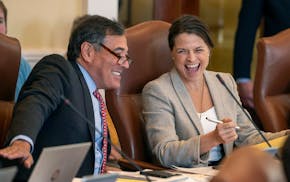Washington – Led by Minnesota Congressman John Kline, House Republicans on Friday passed legislation that would strip control of K-12 education from the Obama administration and roll back the landmark No Child Left Behind Act passed during George W. Bush's presidency.
Kline's bill, the Student Success Act, grants power to state and local governments to determine how to best improve schools and significantly scales back the federal government's role in education.
"The House of Representatives will not stand by and allow the Education Department to micromanage our classrooms and defend the failed status quo," said Kline, chairman of the House Education and the Workforce Committee.
The House approved the legislation 221-207 with no Democratic support. But its prospects beyond Friday's vote remain dim.
President Obama has threatened to veto the legislation and the Democratic-led Senate is drafting its own No Child Left Behind rewrite that differs from the House version. A bill approved by the Senate Education Committee gives states more leeway in developing plans to improve schools, but would still give Secretary of Education Arne Duncan final say over state improvement plans.
Though both parties agreed that No Child Left Behind is overdue for an overhaul, partisanship has trumped compromise in efforts to pen new legislation. Chief among their concerns is the law's requirement that all students in grades three-12 be proficient in math and reading by 2014.
In exchange for relief from the law's stringent requirements, Duncan granted waivers that allowed states to develop their own plans to measure student and teacher performance that were consistent with policies backed by Obama. Congressional Republicans consider the waiver system, which covers 39 states and Washington, D.C., a brazen power grab by the White House.
Since No Child Left Behind expired in 2007, Congress has failed to renew the legislation. The bill passed Friday is a strike against the Bush era law and the Obama waivers. Despite their desire to update the law, Democrats aren't pleased with the final product. Minnesota U.S. Rep. Tim Walz, a former high school teacher who represents southern Minnesota, called it "bad for teachers, students, principals and parents."
A policy shift
The American Association of School Administrators, National Alliance for Public Charter Schools and National School Boards Association are among the groups that backed Kline's bill.
Kline's rewrite scraps No Child's testing, teacher evaluation and funding systems, handing over that responsibility to states. Penalties for schools not meeting federal standards would go away. And more than 70 education programs would end up on the chopping block, replaced with a block of grant money that states and school district would have more freedom to use as they see fit.
"We're not saying that there needn't be some type of accountability … but the specifics are best created at the state and local level," said Gary Amoroso, executive director of the St. Paul-based Minnesota Association of School Administrators.
House Democrats blasted the bill for locking in $1.2 billion in sequestration budget cuts over the next six years. They also argue that, without adequate federal intervention, schools will no longer be held accountable for the performance of low-income, special-education and minority students.
U.S. Rep. George Miller of California, the lead Democrat on the House Education Committee, said the bill "moves our education system in the wrong direction for students and schools already struggling under a broken system."
The legislation forged unusual alliances, bringing together teachers' unions, the U.S. Chamber of Commerce and civil rights groups to denounce it. Bruce Josten, the chamber's executive vice president for government affairs, noted that House members' votes on the bill may be counted in the chamber's annual "How They Voted" scorecard as a vote against business interests.
The Council of the Great City Schools, a coalition of urban school districts that includes Minneapolis and St. Paul, also slammed the bill. A letter from executive director Michael Casserly to Kline and Miller claimed that "the ongoing debate over federal authority versus state authority continues to divert attention from the most important local-level functions of teaching and learning."
Friday's vote marked the first time the House has passed significant education in more than a decade.
"This is a monumental step forward in the fight to improve the nation's education system," Kline said.
Corey Mitchell is a correspondent in the Star Tribune Washington Bureau. Twitter: @C_C_Mitchell
The Latest | Seated juror in hush money trial excused as prosecutors ask judge to sanction Trump
Former Wisconsin Democratic Rep. Peter Barca announces new bid for Congress

